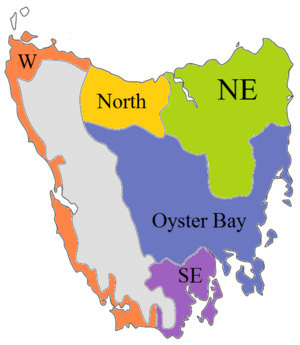Eastern Tasmanian languages facts for kids
Quick facts for kids Eastern Tasmanian |
|
|---|---|
| Oyster Bay – Bruny | |
| Ethnicity: | Oyster Bay, Big River, and Bruny tribes of Tasmanians |
| Geographic distribution: |
Eastern coast of Tasmania and interior |
| Linguistic classification: | Possibly one of the world's primary language families (see Tasmanian languages) |
| Subdivisions: |
Oyster Bay †
Bruny (Southeast) †
|
 Eastern Tasmanian language families per Bowern (2012)
Oyster Bay Southeast Tasmanian |
|
The Eastern Tasmanian languages were a group of languages spoken by the Aboriginal Tasmanians on the eastern coast of Tasmania. Sadly, like all original Tasmanian languages, these languages are now extinct. They are considered a unique group of languages by experts like Claire Bowern.
Exploring the Eastern Tasmanian Languages
These languages were once spoken by different Aboriginal tribes in eastern Tasmania. Experts have studied old word lists to understand how many different languages there were. They believe there were at least four or five distinct languages in this group.
Main Language Groups
The Eastern Tasmanian languages are usually divided into two main groups:
- Oyster Bay (also called Central–Eastern Tasmanian)
- Oyster Bay: Spoken by the Oyster Bay and Big River tribes.
- Little Swanport
- Bruny (also called Southeastern Tasmanian)
- Southeast Tasmanian
- Bruny Island: Spoken by the Bruny tribe.
Some old word lists from the Oyster Bay area also contained words from the Northeastern Tasmanian languages. This mix of words sometimes made it seem like the languages from the east coast were all closely related. However, once experts looked closer, they found that these languages were quite distinct from other Tasmanian language groups.
What Happened to These Languages?
After European settlement, many Aboriginal Tasmanians were moved to Flinders Island. There, a new language developed, called the Flinders Island lingua franca. A lingua franca is a common language used by people who speak different native languages. This new language was mostly based on the Eastern and Northeastern Tasmanian languages.
Later, an English-based Bass Strait Pidgin also used some words from this lingua franca. Today, a modern language called Palawa kani has been created. It uses words from many of the same original Tasmanian languages that formed the Flinders Island lingua franca.
 | Chris Smalls |
 | Fred Hampton |
 | Ralph Abernathy |

